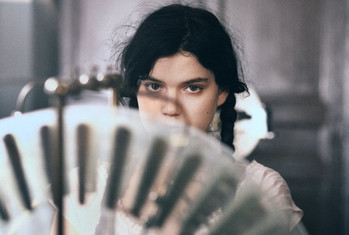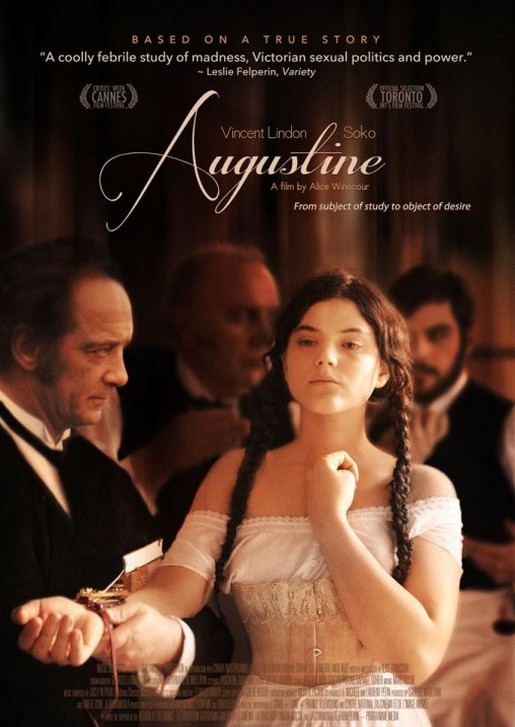
CAST & CREW
Featuring Vincent Lindon (Charcot)
Soko (Augustine)
Chiara Mastroianni (Constance Charcot)
Written and Directed by Alice Winocour
French, with English subtitles
Running time: 1 hour 42 minutes
This film is not rated
Featuring Vincent Lindon (Charcot)
Soko (Augustine)
Chiara Mastroianni (Constance Charcot)
Written and Directed by Alice Winocour
French, with English subtitles
Running time: 1 hour 42 minutes
This film is not rated
Reviewed by John Anderson, Wall Street Journal
The 19th century's catch-all diagnosis for female disturbance, "hysteria," was relatively enlightened: At least the women weren't being burned at the stake. It's also lucky director Alice Winocour was born when she was, given the sorcery she conjures up in her debut feature.
Period pieces, especially ones concerning social issues, are all too often populated with people who have dropped out of the sky. They arrive possessing attitudes about matters of class, sex and science that reflect our times, rather than their own. They help make us feel smug.
Not so "Augustine." The title character, played by the remarkable, single-named actress Soko, is a young kitchen maid subject to disabling fits that resemble epilepsy, save for their unmistakable sexual content. She's become something of a distraction, having suffered a table-clearing, satanic-possession-level seizure during one of her employer's very elegant dinner parties, and is thus relegated to the closest thing 1870s France has to a medical research facility, a combination welfare clinic and madhouse.
As they say around most hospitals, you don't want to be an interesting case, and Augustine's peculiarity is a predictably mixed blessing. She attracts the attention of the real-life French neurologist Jean-Martin Charcot (Vincent Lindon), which means a private room, better conditions and a career as a lab rat: Placed under hypnosis, Augustine is prompted to repeat her seizures for groups of learned French medical men, one of whom—in one of the director's wrier asides—removes his cigar to stare drop-jawed at the erotic writhing before him.
Ms. Winocour's purpose is not to demean or deride. It's occasionally, in fact, too high-minded. Female oppression is her foe, and we get it. We get most of it very early, in fact, despite Ms. Winocour's failure to answer any casual medical questions (such as, what does Charcot do?).
But Charcot is a well-meaning and, as history has shown, ground-breaking researcher into the anatomical links to mental illness. And as played by Mr. Lindon, he is also a man in whom the noble and the profane are at war, whose jaw and loins are desperately clenched. Augustine, predictably, grows attached to her doctor, who has a wife (Chiara Mastroianni) and a mission, but isn't immune to a woman who is vulnerable and advertises the kind of unspeakable sensuality that all of society has been engineered to suppress. Soko is terrific, but it is Mr. Lindon who delivers the performance of the film, his internalized consternation amounting to an eloquent dispatch from the war between the sexes.
The 19th century's catch-all diagnosis for female disturbance, "hysteria," was relatively enlightened: At least the women weren't being burned at the stake. It's also lucky director Alice Winocour was born when she was, given the sorcery she conjures up in her debut feature.
Period pieces, especially ones concerning social issues, are all too often populated with people who have dropped out of the sky. They arrive possessing attitudes about matters of class, sex and science that reflect our times, rather than their own. They help make us feel smug.
Not so "Augustine." The title character, played by the remarkable, single-named actress Soko, is a young kitchen maid subject to disabling fits that resemble epilepsy, save for their unmistakable sexual content. She's become something of a distraction, having suffered a table-clearing, satanic-possession-level seizure during one of her employer's very elegant dinner parties, and is thus relegated to the closest thing 1870s France has to a medical research facility, a combination welfare clinic and madhouse.
As they say around most hospitals, you don't want to be an interesting case, and Augustine's peculiarity is a predictably mixed blessing. She attracts the attention of the real-life French neurologist Jean-Martin Charcot (Vincent Lindon), which means a private room, better conditions and a career as a lab rat: Placed under hypnosis, Augustine is prompted to repeat her seizures for groups of learned French medical men, one of whom—in one of the director's wrier asides—removes his cigar to stare drop-jawed at the erotic writhing before him.
Ms. Winocour's purpose is not to demean or deride. It's occasionally, in fact, too high-minded. Female oppression is her foe, and we get it. We get most of it very early, in fact, despite Ms. Winocour's failure to answer any casual medical questions (such as, what does Charcot do?).
But Charcot is a well-meaning and, as history has shown, ground-breaking researcher into the anatomical links to mental illness. And as played by Mr. Lindon, he is also a man in whom the noble and the profane are at war, whose jaw and loins are desperately clenched. Augustine, predictably, grows attached to her doctor, who has a wife (Chiara Mastroianni) and a mission, but isn't immune to a woman who is vulnerable and advertises the kind of unspeakable sensuality that all of society has been engineered to suppress. Soko is terrific, but it is Mr. Lindon who delivers the performance of the film, his internalized consternation amounting to an eloquent dispatch from the war between the sexes.






